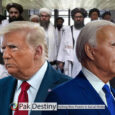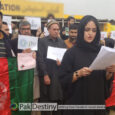
By Raza Ruman
What next for Pakistan in Afghanistan? This is a million dollar question being asked here. Following the withdrawal of most U.S. forces from Afghanistan, the Taliban has made rapid advances across stretches of the country, seizing many provincial capitals from the embattled Afghan government in Kabul.
Aqil Shah, a visiting scholar in the South Asia Program at the Carnegie Endowment for International Peace writes, saying this may appear to be a welcome development for the Taliban’s backers in neighbouring Pakistan. But the ensuing fallout could complicate matters.
Pakistan would have likely preferred a peaceful end to the conflict in Afghanistan, provided that Taliban held decisive influence in any future Afghan government.
Shah says Pakistan would especially like to see the Taliban gain hold of the Afghan security apparatus, including the country’s leading national intelligence service, the National Directorate of Security.
He says it is important to acknowledge that the people of Afghanistan are the primary casualties of the conflict. But Pakistan could also suffer serious fallout from continued instability and increased violence in Afghanistan, including a significant influx of refugees and the resurgence of local militant groups energized by Taliban victories.
“Especially worrisome (for Pakistan) is the resurgence of the Deobandi Pakistani Taliban (Tehrike Taliban Pakistan). This conglomerate of jihadi and sectarian groups, which seeks to overthrow the Pakistani state, has regrouped in their erstwhile strongholds of South and North Waziristan, which border Afghanistan’s insurgent-affected eastern provinces of Paktika and Paktia. The Pakistani Taliban, who are loosely allied with the Afghan Taliban, orchestrated a deadly countrywide terrorist campaign in Pakistan between 2007 and 2014. The leaders of the Pakistani Taliban escaped to Afghanistan after the Pakistani military launched a major offensive against them in 2014. The group since has aided the Afghan Taliban’s military operations against Afghan forces in Afghanistan. While the Pakistani generals might expect the Afghan Taliban to rein in their Pakistani counterparts, there is little evidence to suggest they are in a hurry to oblige,” Shah said
In recent months, the Pakistani Taliban has ramped up violence against both political opponents and Pakistani security forces, while also targeting Chinese interests in Pakistan. A deadly July 2021 bomb attack killed at least thirteen people, including nine Chinese nationals working on a hydropower project under the multi-billion dollar surge of Chinese investment through the China-Pakistan Economic Corridor. In addition to Chinese concerns about the safety of its investments in the country, Pakistan would also risk international isolation if the Taliban seize power and reestablish their Islamic Emirate of Afghanistan, which would put an end to civil liberties, media freedoms, and women’s rights in Afghanistan. But for Pakistan’s ruling generals, these potential costs seem to be outweighed by the benefits of putting a friendly government in Kabul that would deny New Delhi a foothold in their backyard.
Shah further added in addition to neutralizing India’s influence in Afghanistan, the Pakistani military also sees the U.S. exit as a chance to undercut resurgent Pashtun nationalism.
Pashtuns are the largest ethnic group in Afghanistan and have traditionally dominated the Afghan state. Pakistani leaders have typically considered any Pashtun-led government (such as the Ghani regime or the previous one led by former president Hamid Karzai) as providing a fillip to Pashtun nationalists on its side of the Durand Line. “This British colonial-era boundary splits the Pashtun heartland between the two countries. Afghanistan has long refused to recognize the Durand Line as an international border, a refusal the Pakistan see as clear evidence of Kabul’s revisionist designs.”
Shah said: “U.S.-Pakistani relations have already become strained due to the stalled Afghan peace process and the Taliban’s crushing military advances, including the capture of lucrative Afghan towns on the borders with Pakistan and Iran and vital provincial capitals including Kabul.
Taliban launched their transmission from the state television today.#Kabul #Afghanistan #Taliban pic.twitter.com/ma0DPOGckQ
— Wajahat Kazmi 🏴 (@KazmiWajahat) August 16, 2021
Another #Afghanistan photo for the history books from brilliant @AFP colleague @kohsar
— Anuj Chopra (@AnujChopra) August 16, 2021
At #Kabul airport, a gun-wielding #US soldier and #Afghans desperate to escape the countryhttps://t.co/W6i6BirlVT pic.twitter.com/yEuNnJeuog
New high-res #satellite imagery (10:36 am local time, August 16) of the chaotic scene underway at #Kabul’s Hamid Karzai International Airport in #Afghanistan as thousands of people converged on the tarmac & airport runways as countries attempt to evacuate personnel from the city. pic.twitter.com/L6lhlVms54
— Maxar Technologies (@Maxar) August 16, 2021
Video shows thousands of Afghans desperately chasing after and clinging to a US aircraft moments before it took off from #Kabul airport in the frantic attempt to flee the country after the #Taliban takeover. 👀
— No Jumper (@nojumper) August 16, 2021
pic.twitter.com/5RMnh7xwmm
Taliban Leader Mullah Abdul Ghani Baradar Declared Afghanistan's New President and Afghanistan name Changed to “Islamic Emirate of Afghanistan.#Afghanistan #kabul pic.twitter.com/pft6f9eqLS
— Kalwer Abid (@AbidKalwer) August 16, 2021
Afghanistan Stay Strong
— Pooja Pandey (@poojapandey_24) August 16, 2021
Whole world is praying for you 🙏#Afghanistan #AfghanWomen #Kabul pic.twitter.com/dd5E63yf0h
NOW – Thousands of people trying to flee the Taliban arrive outside #Kabul airport. Gunshots can be heard.pic.twitter.com/Gt4vVZBIkz
— Disclose.tv 🚨 (@disclosetv) August 16, 2021
This is an airplane. Not a bus. Look at how desperately people want to escape Afghanistan.#Kabul #KabulAirport #Afghanistan #Taliban pic.twitter.com/1a2oQrehKY
— Wajahat Kazmi 🏴 (@KazmiWajahat) August 16, 2021
Welcome to the kingdom of talibans #Afghanistan #kabul pic.twitter.com/X7VKIYxNP9
— Mr bnkhalid 🇵🇰 (@Omer_hn_yar) August 16, 2021
“Pakistan’s perceived importance in brokering an Afghan peace deal, U.S. President Joe Biden has shunned Khan from the process, which has frustrated Pakistani officials. The Biden administration expected Pakistan’s military leaders to use their influence over the Taliban to persuade them to accept a power-sharing agreement with the Afghan government, in return for international recognition and financial aid. But Islamabad has done little to restrain the Taliban from their relentless campaign to take over Afghanistan by force, even though Pakistani leaders claim to be genuinely interested in finding a political settlement to the conflict. And given a haphazard American exit, the absence of a coordinated international approach to Afghanistan, and the willingness of permanent UN Security Council members like Russia, China, and even the UK to work with a Taliban regime, the Pakistani generals remain confident that Islamabad will not pay a heavy price for continuing its support of the Taliban,” Shah concludes. PAK DESTINY






